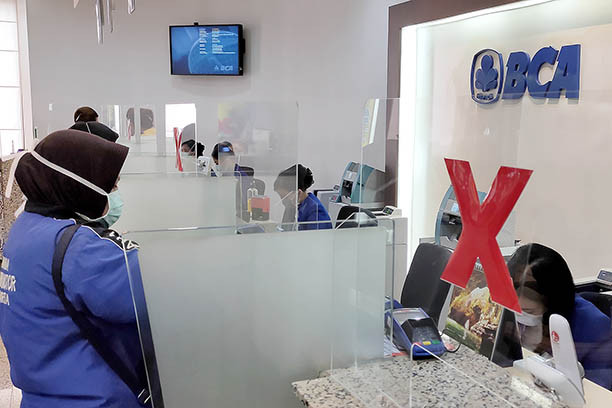Popular Reads
Top Results
Can't find what you're looking for?
View all search resultsPopular Reads
Top Results
Can't find what you're looking for?
View all search resultsBCA records net profi t dip in 2020 amid higher provisioning, pandemic impact
Change text size
Gift Premium Articles
to Anyone
B
ank Central Asia (BCA), Indonesia’s largest privately owned bank, has seen its net profit dip for the first time in at least 16 years as the COVID-19 pandemic affected loan demand and credit repayments.
The publicly-listed lender’s net profit dipped 5 percent year-on-year (yoy) to Rp 27.1 trillion (US$1.94 billion) in 2020 amid higher provisioning and weak credit growth. BCA had booked continual profit growth since at least 2004.
BCA’s net interest income (NII) grew 7.3 percent yoy to Rp 54.55 trillion in 2020, weaker than growth in the previous year at 12.1 percent.
“Generally, our performance went down in 2020, although it is not as bad as with other banks,” BCA president director Jahja Setiaatmadja said at a virtual press conference on Monday.
State-owned banks have recorded double-digit profit dips last year, with Bank Mandiri, the second-largest bank by asset value, seeing its profit dip by 37.7 percent yoy to Rp 17.1 trillion last year, its lowest since 2016. Bank Negara Indonesia (BNI), meanwhile, saw an even steeper drop in profit of 78.7 percent yoy.
Read also: Top state-owned banks post record-low profits
The coronavirus outbreak disrupted economic activities following government-imposed restrictions to contain the disease, which include limited operational hours for businesses. It has also affected people’s purchasing power as millions have lost their jobs.
Hence, the economic slowdown simultaneously strained borrowers’ ability to repay loans and hampered loan demand growth in Indonesia, a double blow to the country’s banks.
BCA’s loan disbursements fell 2.5 percent yoy to Rp 588.7 trillion in 2020, led by a decline in the small and medium enterprise (SME) segment and the consumer segment. Loan disbursement in the corporate segment still grew at 7.7 percent yoy to Rp255.1 trillion last year.
Meanwhile, loan provisions rose 152.3 percent yoy to Rp11.6 trillion in 2020 as a precautionary measure to potentially deteriorating assets.
The Financial Services Authority (OJK) established a loan restructuring program in March last year under POJK No. 11/2020, which has been extended to 2022.
Read also: Loan restructuring program extended until 2022
The regulation relaxes debt quality assessments and restructuring requirements for loans up to Rp 10 billion for borrowers affected by COVID-19.
BCA restructured loans amounting to Rp 97.5 trillion in 2020 in its banking service, a 965.6 percent increase from 2019, its financial report shows.
Consequently, BCA’s non-performing loan (NPL) ratio – the proportion of bad loans to total debt – closed at 1.8 percent in 2020, higher than last year’s 1.3 percent, but still below the legal 5 percent ceiling and the industry average of 3.18 percent as of November 2020, according to OJK data.
BCA’s Jahja said that BCA had also invested in government debt papers (SBN) to prop up company revenue amid slowed loan growth.
He added that many state-owned companies had cancelled plans to take out more loans in late 2020. The companies, which included oil and gas giant Pertamina, train operator PT Kereta Api Indonesia (KAI) and electricity giant PLN, made repayments instead.
“This could have actually been bigger [in 2020] but, at the end of the year, many SOEs made repayments,” he said.
BCA’s full-year financial presentation shows that non-interest income dipped 0.5 percent yoy to Rp 20.2 trillion. The dip occurred as at-home customers reduced the use of ATMs.
Going forward, BCA finance director Vera Eve Lim said the company aimed for loan growth between 4 percent and 6 percent this year as the economy recovers.
BCA wrote in a statement that it would focus on normalizing restructured loans this year.
“The government is doing several good things this year. We hope for economic recovery, including for improvements in mobility,” she said.
She also said the company had allocated Rp 5.2 trillion for capital expenditure this year, higher than the Rp 5 trillion last year.
The funds would go to developing BCA’s digital banking services, such as building a new data center in Cikarang, West Java, and opening a Halo BCA call center in Semarang, Central Java.










